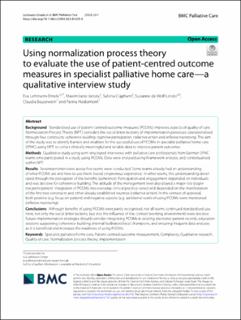Please use this identifier to cite or link to this item:
https://doi.org/10.21256/zhaw-29617| Publication type: | Article in scientific journal |
| Type of review: | Peer review (publication) |
| Title: | Using normalization process theory to evaluate the use of patient-centred outcome measures in specialist palliative home care : a qualitative interview study |
| Authors: | Lehmann-Emele, Eva Jansky, Maximiliane Clapham, Sabina de Wolf-Linder, Susanne Bausewein, Claudia Hodiamont, Farina |
| et. al: | No |
| DOI: | 10.1186/s12904-023-01329-8 10.21256/zhaw-29617 |
| Published in: | BMC Palliative Care |
| Volume(Issue): | 23 |
| Issue: | 1 |
| Issue Date: | 3-Jan-2024 |
| Publisher / Ed. Institution: | BioMed Central |
| ISSN: | 1472-684X |
| Language: | English |
| Subjects: | Complexity; Implementation; Normalization process theory; Patient-centred outcome measurement; Qualitative research; Quality of care; Specialist palliative home care; Humans; Qualitative research; Attitude of health personnel; Outcome assessment, health care; Palliative care; Home care services; Gesundheitsversorgung |
| Subject (DDC): | 362: Health and social services 610.73: Nursing |
| Abstract: | Background: Standardised use of patient-centred outcome measures (PCOMs) improves aspects of quality of care. Normalization Process Theory (NPT) considers the social (inter-)actions of implementation processes operationalised through four constructs: coherence-building, cognitive participation, collective action and reflexive monitoring. The aim of the study was to identify barriers and enablers for the successful use of PCOMs in specialist palliative home care (SPHC) using NPT, to collect clinically meaningful and reliable data to improve patient outcomes. Methods: Qualitative study using semi-structured interviews with palliative care professionals from German SPHC teams who participated in a study using PCOMs. Data were analysed using Framework analysis, and contextualised within NPT. Results: Seventeen interviews across five teams were conducted. Some teams already had an understanding of what PCOMs are and how to use them, based on previous experience. In other teams, this understanding developed through the perception of the benefits (coherence). Participation and engagement depended on individuals and was decisive for coherence-building. The attitude of the management level also played a major role (cognitive participation). Integration of PCOMs into everyday clinical practice varied and depended on the manifestation of the first two constructs and other already established routines (collective action). In the context of appraisal, both positive (e.g. focus on patient) and negative aspects (e.g. additional work) of using PCOMs were mentioned (reflexive monitoring). Conclusions: Although benefits of using PCOMs were partly recognised, not all teams continued standardised use. Here, not only the social (inter-)actions, but also the influence of the context (working environment) were decisive. Future implementation strategies should consider integrating PCOMs in existing electronic patient records, education sessions supporting coherence-building, internal facilitators/local champions, and ensuring frequent data analyses as it is beneficial and increases the readiness of using PCOMs. |
| URI: | https://digitalcollection.zhaw.ch/handle/11475/29617 |
| Fulltext version: | Published version |
| License (according to publishing contract): | CC BY 4.0: Attribution 4.0 International |
| Departement: | School of Health Sciences |
| Organisational Unit: | Institute of Nursing (IPF) |
| Published as part of the ZHAW project: | Electronic PerSon-cENtred care and Specialized Palliative Care for people with dementla: lmproving the quality of life with Outcome guided Recognition and assessment of relevant Symptoms, neeDs and care issues (eSENIORS) |
| Appears in collections: | Publikationen Gesundheit |
Files in This Item:
| File | Description | Size | Format | |
|---|---|---|---|---|
| 2024_Lehmann-etal_Using-normalization-process-theory-palliative-care_BMC.pdf | 956.78 kB | Adobe PDF |  View/Open |
Show full item record
Lehmann-Emele, E., Jansky, M., Clapham, S., de Wolf-Linder, S., Bausewein, C., & Hodiamont, F. (2024). Using normalization process theory to evaluate the use of patient-centred outcome measures in specialist palliative home care : a qualitative interview study. BMC Palliative Care, 23(1). https://doi.org/10.1186/s12904-023-01329-8
Lehmann-Emele, E. et al. (2024) ‘Using normalization process theory to evaluate the use of patient-centred outcome measures in specialist palliative home care : a qualitative interview study’, BMC Palliative Care, 23(1). Available at: https://doi.org/10.1186/s12904-023-01329-8.
E. Lehmann-Emele, M. Jansky, S. Clapham, S. de Wolf-Linder, C. Bausewein, and F. Hodiamont, “Using normalization process theory to evaluate the use of patient-centred outcome measures in specialist palliative home care : a qualitative interview study,” BMC Palliative Care, vol. 23, no. 1, Jan. 2024, doi: 10.1186/s12904-023-01329-8.
LEHMANN-EMELE, Eva, Maximiliane JANSKY, Sabina CLAPHAM, Susanne DE WOLF-LINDER, Claudia BAUSEWEIN und Farina HODIAMONT, 2024. Using normalization process theory to evaluate the use of patient-centred outcome measures in specialist palliative home care : a qualitative interview study. BMC Palliative Care. 3 Januar 2024. Bd. 23, Nr. 1. DOI 10.1186/s12904-023-01329-8
Lehmann-Emele, Eva, Maximiliane Jansky, Sabina Clapham, Susanne de Wolf-Linder, Claudia Bausewein, and Farina Hodiamont. 2024. “Using Normalization Process Theory to Evaluate the Use of Patient-Centred Outcome Measures in Specialist Palliative Home Care : A Qualitative Interview Study.” BMC Palliative Care 23 (1). https://doi.org/10.1186/s12904-023-01329-8.
Lehmann-Emele, Eva, et al. “Using Normalization Process Theory to Evaluate the Use of Patient-Centred Outcome Measures in Specialist Palliative Home Care : A Qualitative Interview Study.” BMC Palliative Care, vol. 23, no. 1, Jan. 2024, https://doi.org/10.1186/s12904-023-01329-8.
Items in DSpace are protected by copyright, with all rights reserved, unless otherwise indicated.